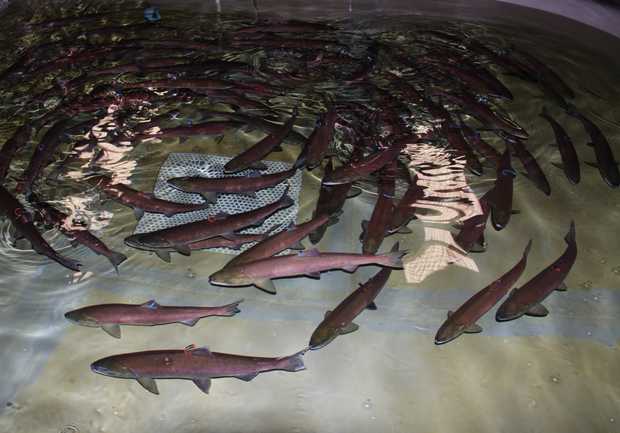forum
library
tutorial
contact

Oregon Joins Other Plaintiffs
in BiOp Lawsuit
by Bill Rudolph
NW Fishletter, October 2, 2014
|
the film forum library tutorial contact |

|
Oregon Joins Other Plaintiffs
by Bill Rudolph
|
 The state of Oregon announced Sept. 24 that it will join other plaintiff groups in the next round of litigation over the hydro BiOp in federal district court.
The state of Oregon announced Sept. 24 that it will join other plaintiff groups in the next round of litigation over the hydro BiOp in federal district court.
The state had been a plaintiff-intervener in previous court battles over the federal salmon plan to improve ESA-fish populations while operating dams on the Columbia and Snake rivers.
The announcement deadline was Sept. 29, extended 30 days after it was reported the state was in talks with the Department of Justice over what it would take to support the BiOp this time around. It was also reported that the talks centered on potential modifications to dam spill that would satisfy the state, especially more targeted spill.
But on Sept. 24, the state filed a 60-day notice to sue. The letter echoed the complaints of other plaintiffs who are arguing many points that go back to the 2008 BiOp. These include the jeopardy standard used by defendant agencies to support its case, but never actually declared illegal by now-retired U.S. District Judge James Redden. Redden had found other faults with the last four tries at a viable salmon plan, while getting more spill at dams and a billion dollars for more habitat restoration.
"Oregon's decision to continue to litigate the hydro system BiOp is disappointing but not surprising," said Terry Flores, executive director of Northwest River Partners, a group of utilities and other river users with defendant-intervener status. "They remain out of step with the rest of the region's states and tribes that strongly support the BiOp and who will vigorously defend it in court. They also show they are out of touch with the reality that the BiOp--the most comprehensive restoration plan anywhere in the nation--is working as evidenced by the incredible returns of salmon and steelhead to the Columbia and Snake rivers we've been witnessing for over a decade."
Oregon said the 2008 BiOp and its subsequent revisions through 2014 still "arbitrarily" depend on tributary and estuary habitat improvement actions to offset adverse impacts of dam operations, while ignoring that many are behind schedule, or not implemented, and not producing predicted survival benefits.
The state listed other failures with the latest salmon plan, including reducing and delaying spill, failing to minimize bulk spill, and increasing fish transportation "while failing to respond to survival benefits of increased spill".
Oregon said the feds had "arbitrarily" discounted new scientific information that demonstrated benefits from increased spill, and failed to consider more flows or reservoir drawdowns to boost travel times of juvenile fish.
The state was a main proponent of a 10-year, billion-dollar spill test that supporters claimed could raise adult returns to recovery levels. The proposed spill test was thoroughly panned last winter by other experts, including the Independent Scientific Advisory Board, which did say it offered some merit if a long list of problems with its study design could be resolved. In truth, hardly anyone seriously believes those problems--some statistical, some experimental--can ever be overcome.
The state also said the BiOp did not adequately account for new information demonstrating impacts of climate change on habitat degradation, or impacts from increased mortality from cormorants and other predators.
Other plaintiffs include the National Wildlife Federation, Washington Wildlife Federation, Idaho Wildlife Federation, Sierra Club, Pacific Coast Federation of Fishermen's Associations, Institute for Fisheries Resources, Idaho Rivers United, Northwest Sportfishing Industry Association, American Rivers, International Federation of Fly Fishers, Salmon for All, NW Energy Coalition, and Columbia Riverkeeper.
By the deadline, the Nez Perce Tribe, also a plaintiff-intervener in the previous litigation, indicated they would join the latest round of litigation.
learn more on topics covered in the film
see the video
read the script
learn the songs
discussion forum
